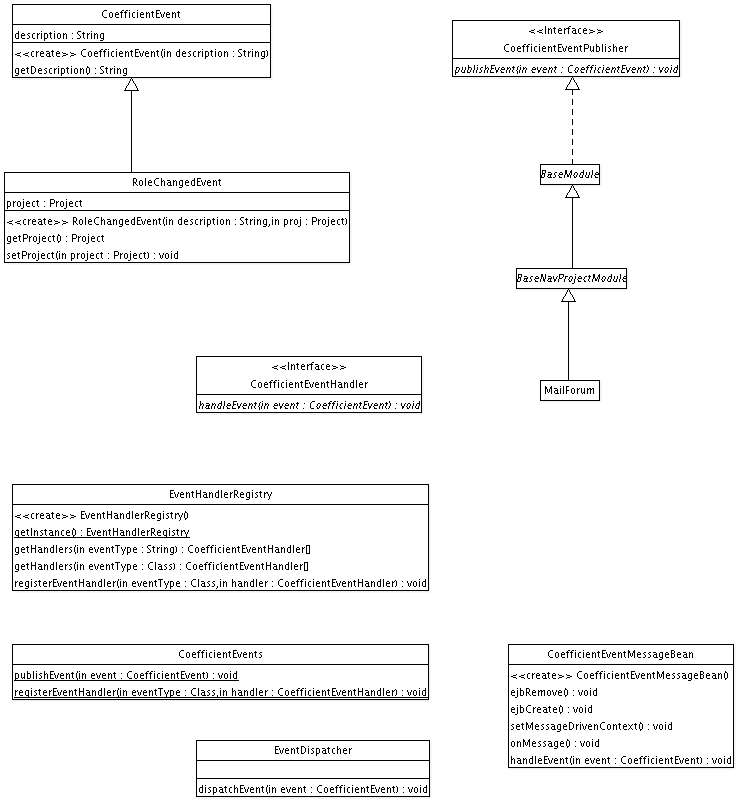
This document is intended to people who want to understand how the Coefficient Event System works.
It will be of particular interest for writers of modules, where those modules need to be aware of activity in other parts of the system. Examples include:
The Coefficient Event System (new to version 0.9.5-2), is a mechanism that allows system components to be notified of changes in other parts of the system. It does so without the two parts needing to know about each other, thus helping to maintain a clean design. The event system forms the "glue" between the components. Events, when they occur, are published to the event system. From there, interested components are notified that the event has occurred. They then handle the event and perform whatever processing is required.
The Coefficient event system employs a fairly standard and widely used model for event publishing and handling. The main concepts involved are:
The core class hierarchy for the event system is show below. These classes are all in the za.org.coefficient.events package.

These classes are explained briefly below:
CoefficientEvent: this is the base class for all Coefficient event objects. This class implements the Serializable interface, so that is can be sent to a JMS queue (see below). When an event is published in Coefficient, an instance of CoefficientEvent (or a subclass) is created and sent to the event system. RoleChangedEvent is an example of a CoefficientEvent subclass.
CoefficientEventPublisher: this is the interface to be implemented by all Coefficient classes that publish events. Currently, the system isn't really concerned with where events come from, so this interface is not really needed. However, it does make explicit that a class can publish events, which helps to keep the design clear. In future, this interface could be used more extensively. In the diagram above, it is evident that BaseModule implements CoefficientEventPublisher. This make it trivial for any module, including (for instance) MailForum above, to publish events.
CoefficientEventHandler: this is the interface to be implemented by all Coefficient classes that are interested in receiving event notifications (i.e. that handle events). When an event is dispatched to the handler, the handleEvent method is invoked, with the CoefficientEvent instance as parameter.
EventHandlerRegistry: this class implements a singleton registry of event handlers, and is used to determine which handlers are interested in a particular event (i.e. to which handlers an event should be dispatched). Event handlers need to register with the registry to receive events.
EventDispatcher: this class implements the dispatching of events to appopriate handlers, using the registry to decide which handlers should receive the event.
CoefficientEvents: this is a utility class that simplifies the registering of handlers and the publishing of events. It implements two strategies for accessing the relevant event system functions. For managed EJB environments, it uses a JMS message to invoke the methods on a MessageBean. In this scenario, both handler registration and event processing is done asynchronously. For unmanaged environments without JMS, it invokes the appropriate methods directly. In this environment, handler registration is done synchronously, but event processing is done asynchronously by spawing a new Thread to do the work.
CoefficientEventMessageBean: this is the MessageBean mentioned above.
Future enhancements could include:
Currently, there is one major known issue: